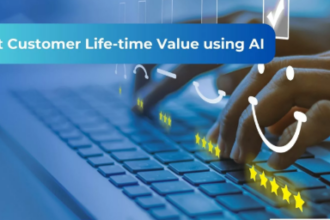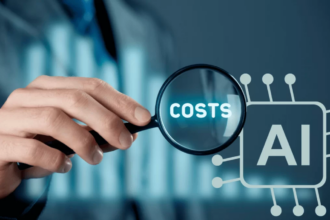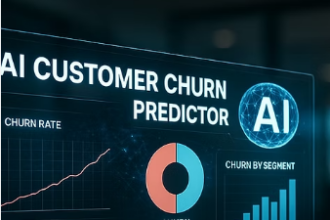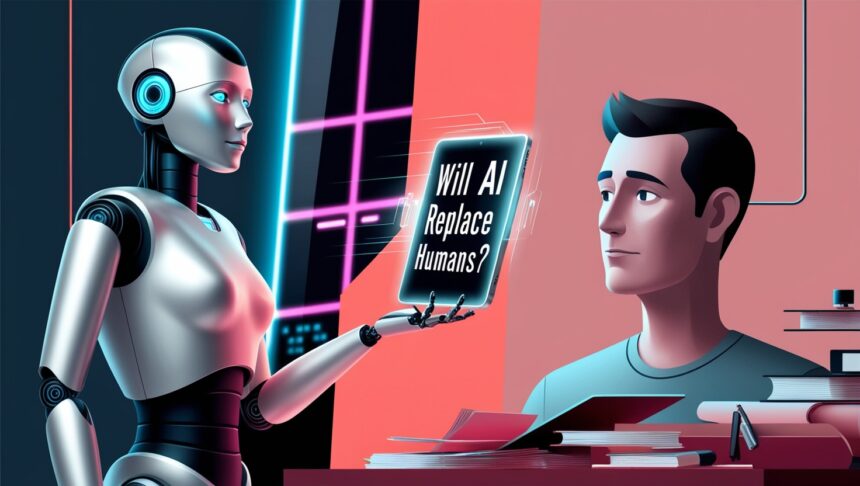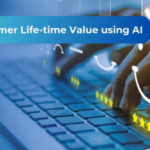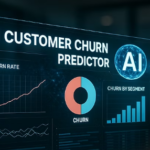In this article, I will discuss the Will AI Replace Humans. With the rapid advancement in artificial intelligence, there is a growing concern about robots replacing humans in the workforce.
We will analyze which jobs are the most at risk, what will always remain uniquely human, and how AI can transform the workplace without completely replacing humans.
Understanding AI?
Artificial Intelligence (AI) is the representation of human intelligence processes by machine and computer systems.

These functions include problem solving, language comprehension, and the ability to recognize patterns. AI functions through algorithms and data, which enables the system to adapt and improve over time.
AI is changing the way we live as well as work by automating tasks and providing intelligent solutions for daily problems; these include virtual assistants, like Siri, and more complex systems in the healthcare and finance industries.
Will AI Replace Humans?
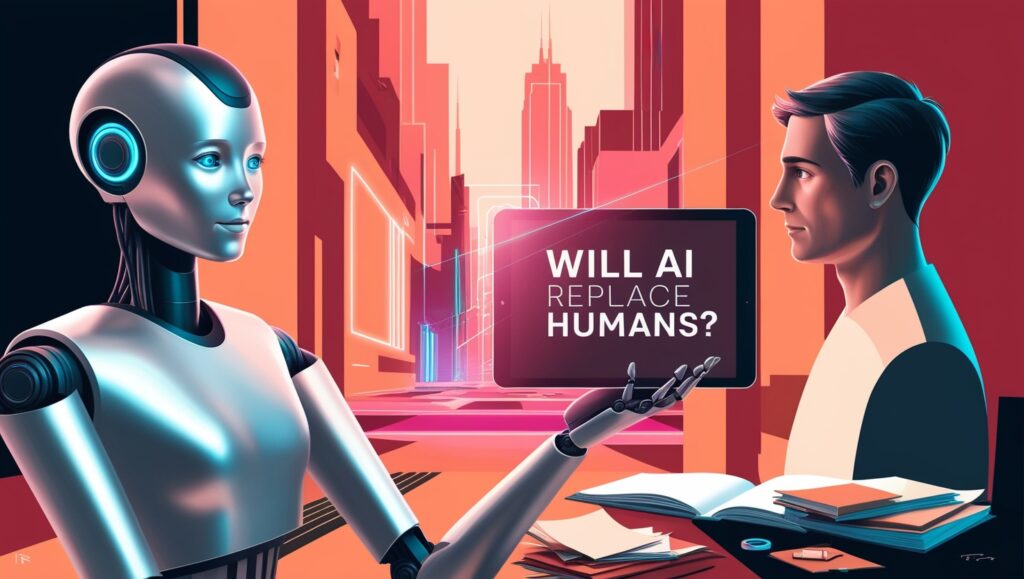
AI Taking Over Mundane Work
Jobs like data entry, repetitive manufacturing, customer service, and anything with a well-defined workflow will be taken over by AI.
Creativity and Emotional Intelligence
Jobs that have higher complexity will require human empathy, creativity, critical thinking, or multi layered reasoning, and such work will not be replaced by AI.
Augmentation Rather Than Replacement
By taking care of mundane tasks, AI can improve productivity and allow humans to concentrate on interpersonal and strategic work.
More Work Opportunities
New AI technologies will require maintenance, development, and with it, new roles in AI ethics will emerge.
Reskilling the Workforce
Adapting to change will require learning new skills that help to sustain relevance in the shifting employment landscape.
Policies Supporting Economic Change
The displacement of jobs concerns requires sustaintial polcies to support transition, plus so-called social safety nets.
Jobs at High Risk of Automation
Manufacturing and Assembly Line Workers: Robots can easily automate repetitive tasks done on assembly lines.
Data Entry Clerks: The manual entry of data is now much faster and accurate due to AI programs.
Retail Cashiers: Payment through self service kiosks and automated systems lessens the need for human cashiers.
Transportation and Delivery Drivers: Drones and self driving cars are a threat to driving jobs.
Telemarketers & Customer Service Representatives: Basic customer questions are able to be automated with chatbot programs, and calling systems can be pre-recorded.
Warehouse and Inventory Staff: Robotics and AI systems designed for sorting and stocking streamline operations in warehouses.
Tips For Safe AI Replace Humans
Encourage Collaboration with AI Accomplishments
Incorporate AI in manners that enrich human activities instead of supplanting roles.
Aid in Technological Transformation
Roll out programs to train employees for new or other emerging technologies.
Draft Responsible AI Policies
Policies on AI system implementation should ensure accountability, non-bias, and safeguarding of citizens’ private information.
Provide For Human Intervention
Have humans participate in the crucial decisions in sensitive areas or critical domains.
Cultivate Internal Transparency
Make sure workers know what plans are made regarding AI and try to solve their worries before they voice them.
Promote Learning and Exploration of New Cultures
Encourage employees to integrate and change the growing global phenomena and learn new skills.
The Evolving Nature of Human Work
Human labor is transitioning into roles concerned with creative thought, emotional engagement, and advanced problem solving as AI and automation grow.
Many automated processes enable individuals to concentrate on higher-level processes such as innovation and strategy development. New job roles are being created like AI trainers, data analysts, and even digital ethicists.
Such evolutions require change in the form of renewed learning and AI adaptability and encourages workers to direct their focus to skills that augment AI systems rather than clash with them. Companies are restructuring processes to use human and machine strengths in unison to achieve optimal productivity.
Ethical and Economic Implications
The Threat of Unemployment
Sectors that depend heavily on monotonous activities are exposed to unemployment risks due AI technology.
Sociological Impacts
Gaps may increase between skilled and unskilled blue-collar workers due to low-skill automation.
Data and Information Security
Concerns regarding information safety, consent to capture private material, and data destruction arise from the data-centered information systems employed by AI technology.
Equity
If left uncontrolled, social AI calculations could bias against the less privileged as they already do and further exacerbate the duality gap in society.
Business Activity
Due to the evolving nature of AI, economic augmentation, improvement of productivity, and innovation are on the rise.
Social Protections
Legal safeguards are liable to advance and encumber with the growing needs of workers.
Preparing for the Future
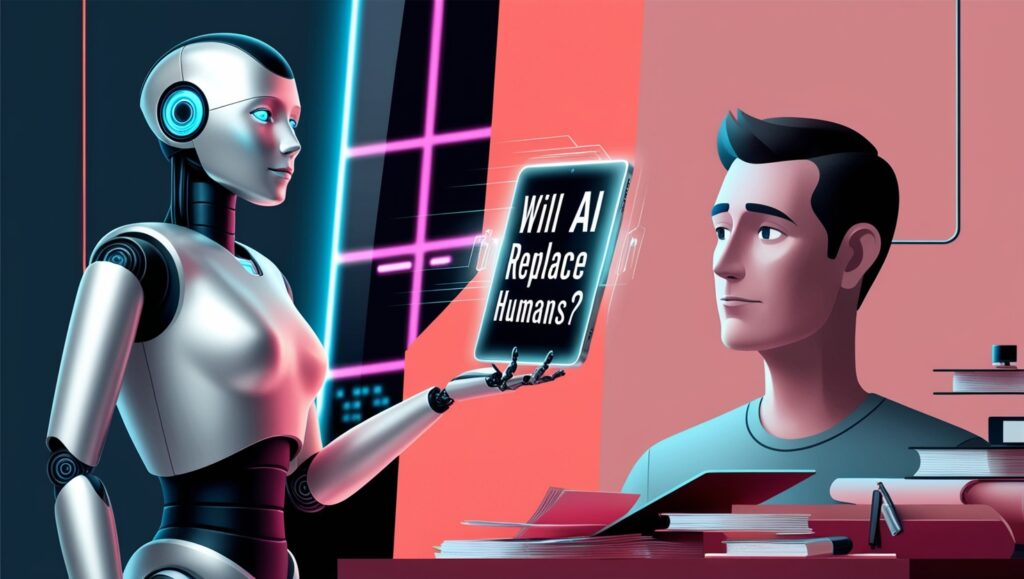
Adopt and Adapt Skills: Tackle creativity, emotional intelligence, and critical thinking that AI won’t replicate easily.
Work in Progress: Refresh skills with learning resources, online classes, and workshops.
Start Embracing Technology: Use AI to boost productivity and learn how to collaborate with future technologies.
Be Aware of What’s Hot: Follow AI trends and developments and their impact on the world to make informed predictions.
Pay Attention to Soft Skills: Flexibility and adaptability will be paramount in any organizational setup.
Support Relevant Legal Frameworks: Draw attention to reskilling policies, social safeguards, job change support systems, and protective frameworks.
Pros & Cons
| Pros of AI in the Workplace | Cons of AI in the Workplace |
|---|---|
| Increases productivity and efficiency | Potential job displacement for routine roles |
| Automates repetitive and mundane tasks | Risk of widening income inequality |
| Enhances decision-making with data insights | Privacy and data security concerns |
| Creates new job opportunities in tech | Possible bias and unfairness in AI algorithms |
| Improves safety by handling dangerous tasks | Requires significant investment and training |
| Supports innovation and new business models | Dependence on technology may reduce human skills |
Conclusion
To summarize, AI is changing how we perform tasks at work by automating numerous dull and monotonous activities. It will not, however, completely replace humans, particularly in creative, empathetic, and nuanced decision-making functions.
AI, rather, needs to be viewed as a powerful tool that enhances human capacities and creates new possibilities – new doors ready to be unlocked. Humans can still thrive by adapting through reskilling and partnering with AI, ensuring their role stays indispensable in the transformed future of work.

